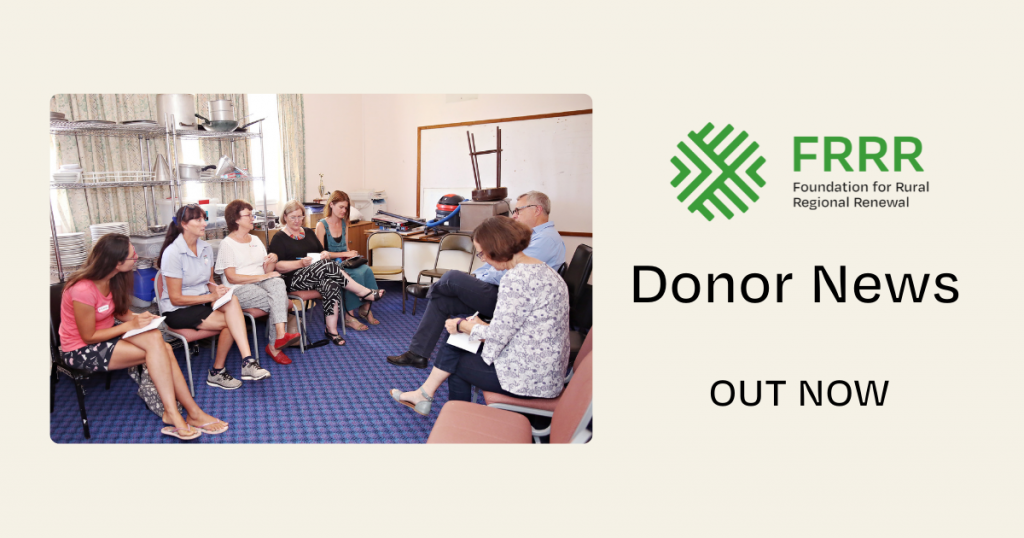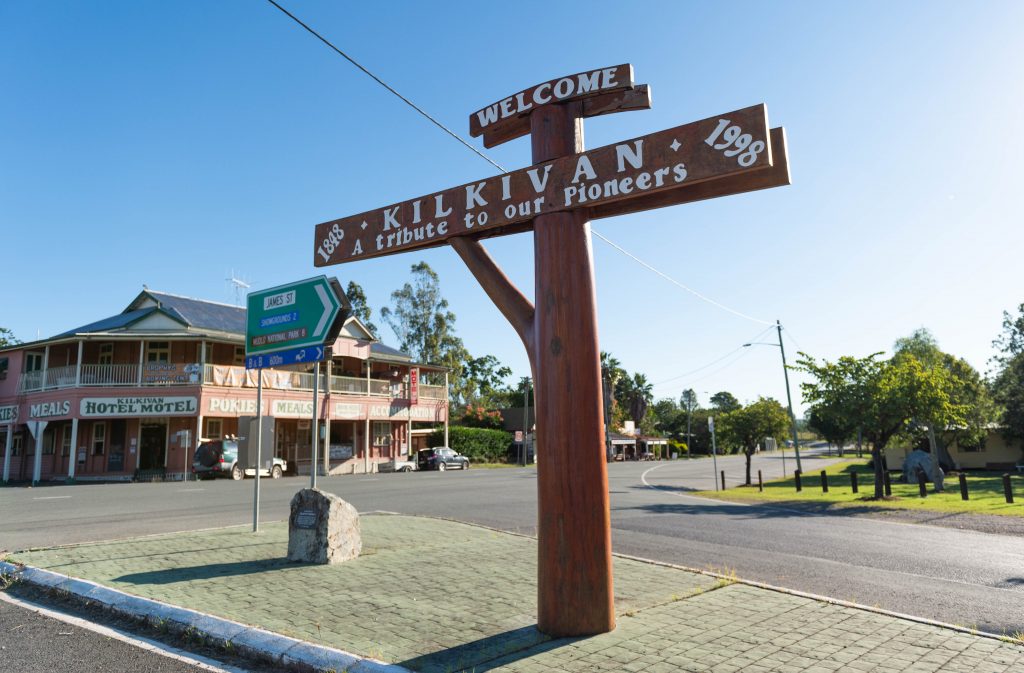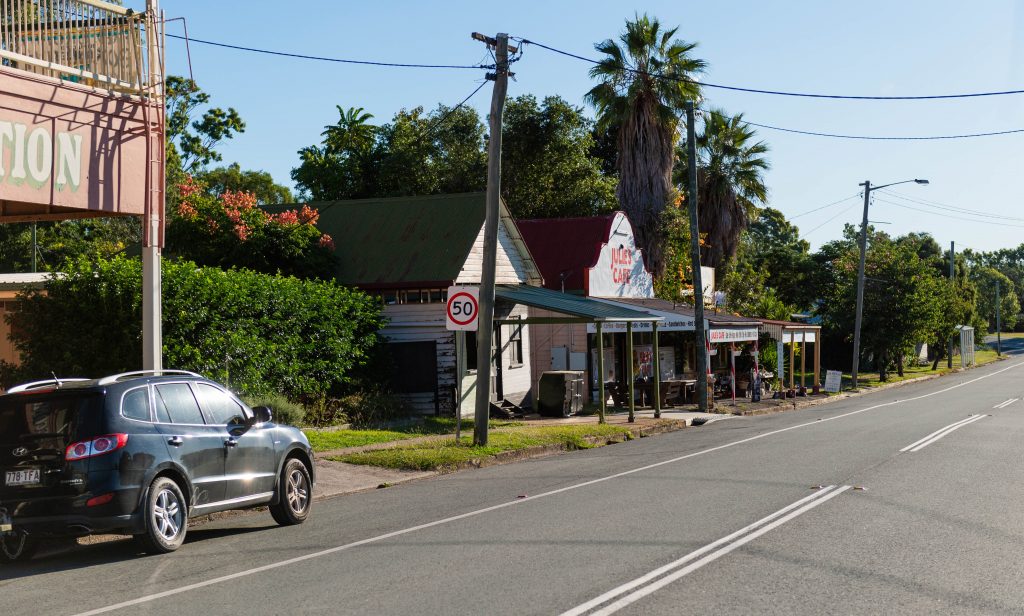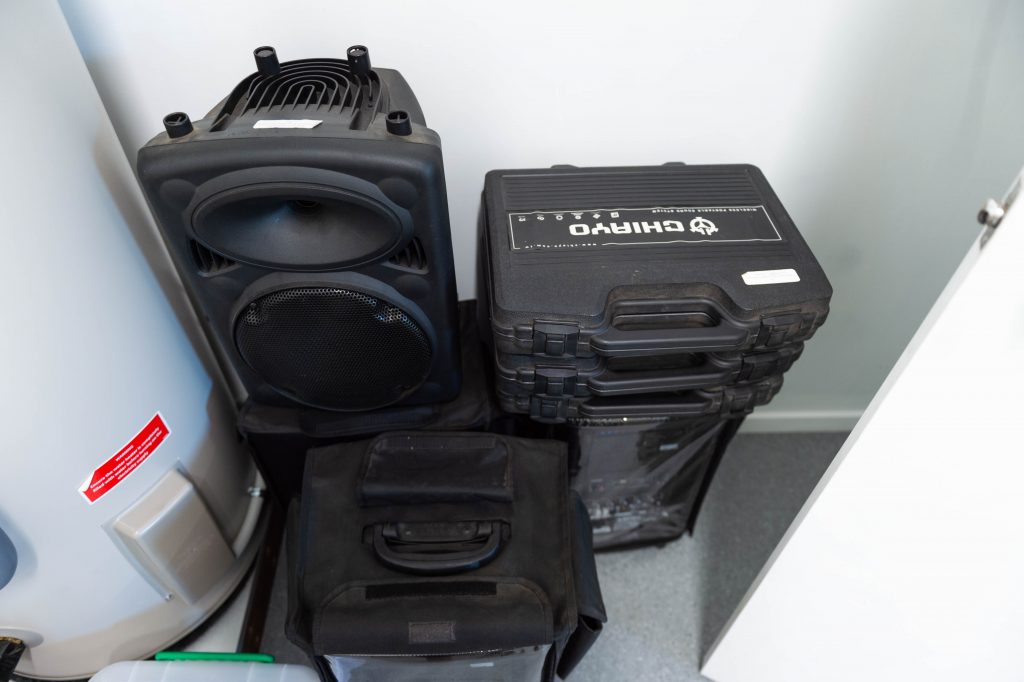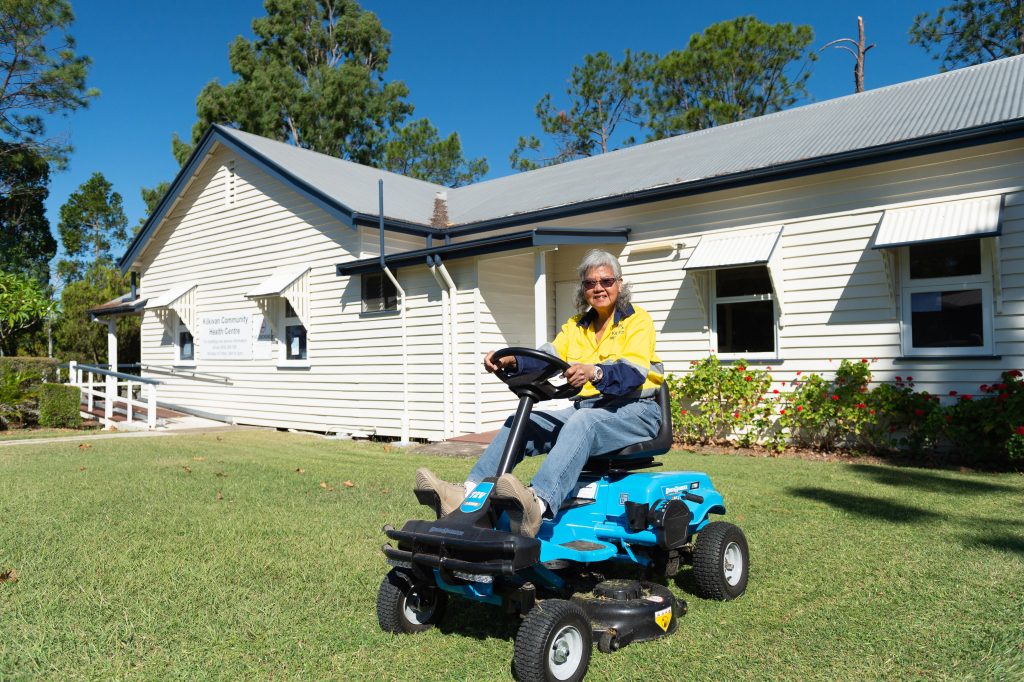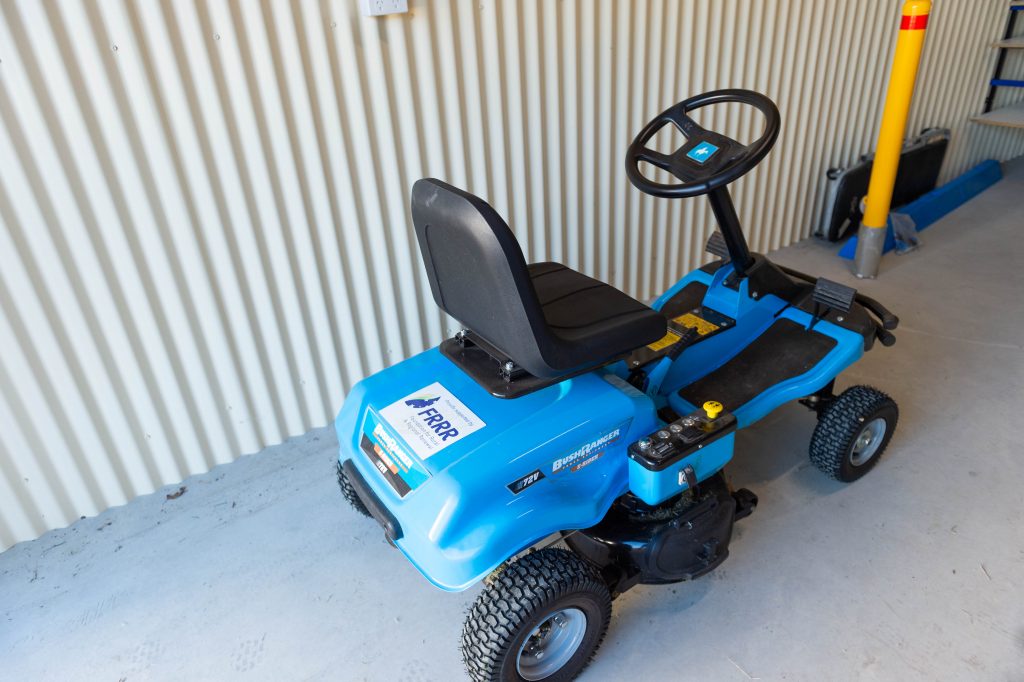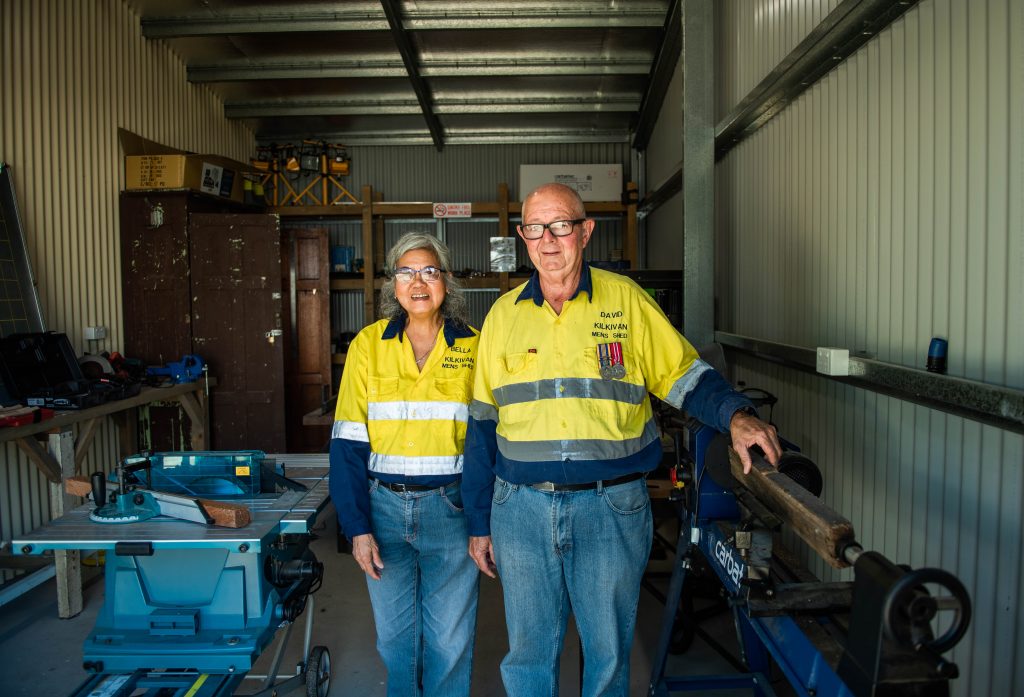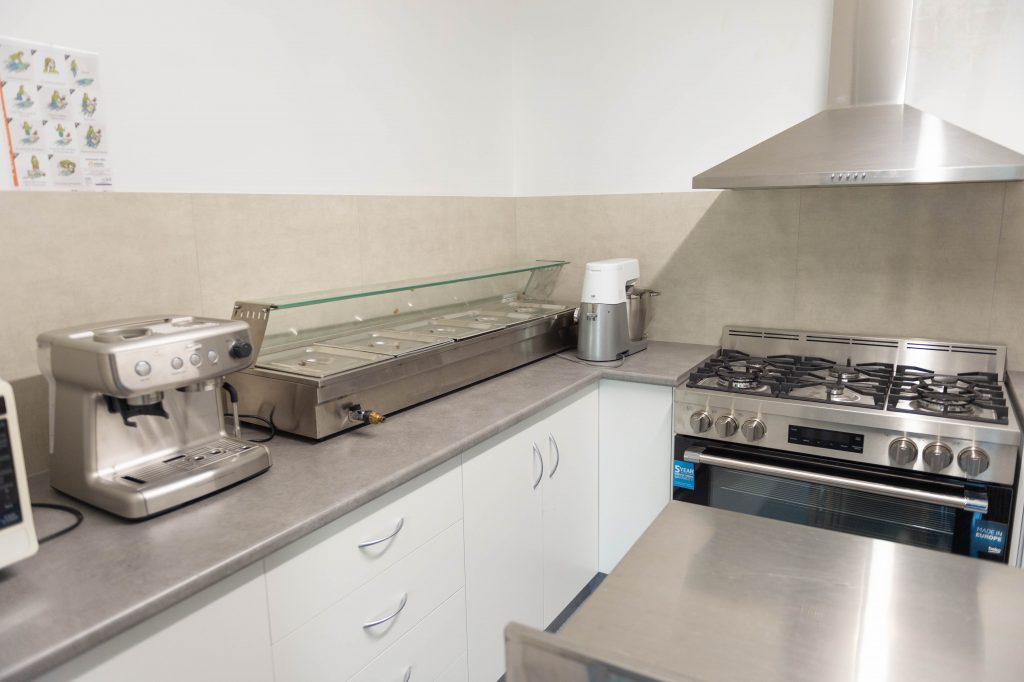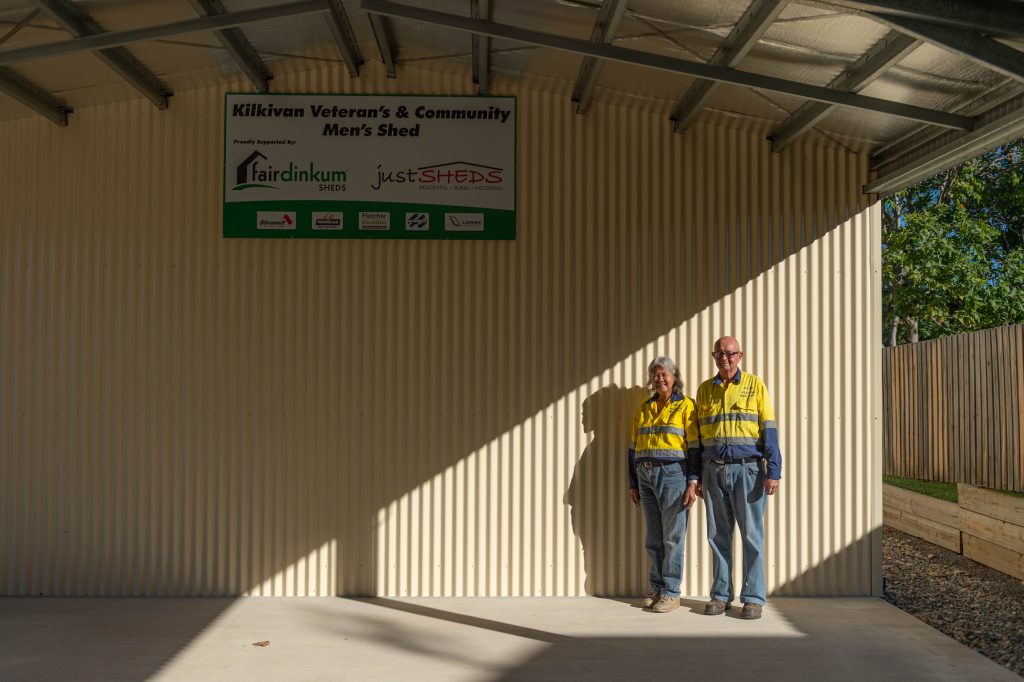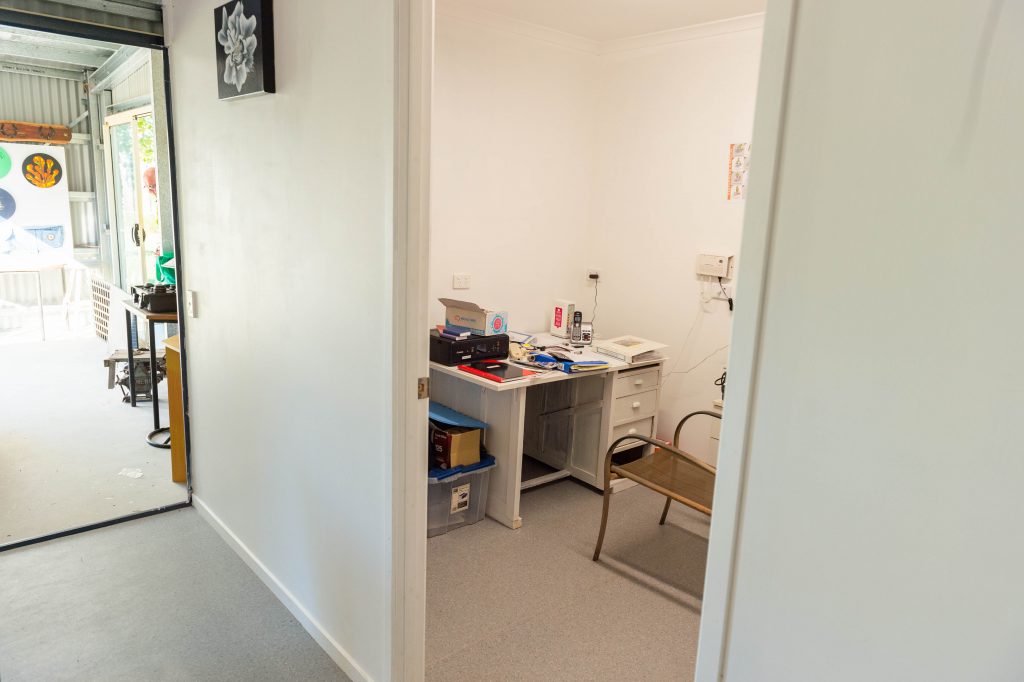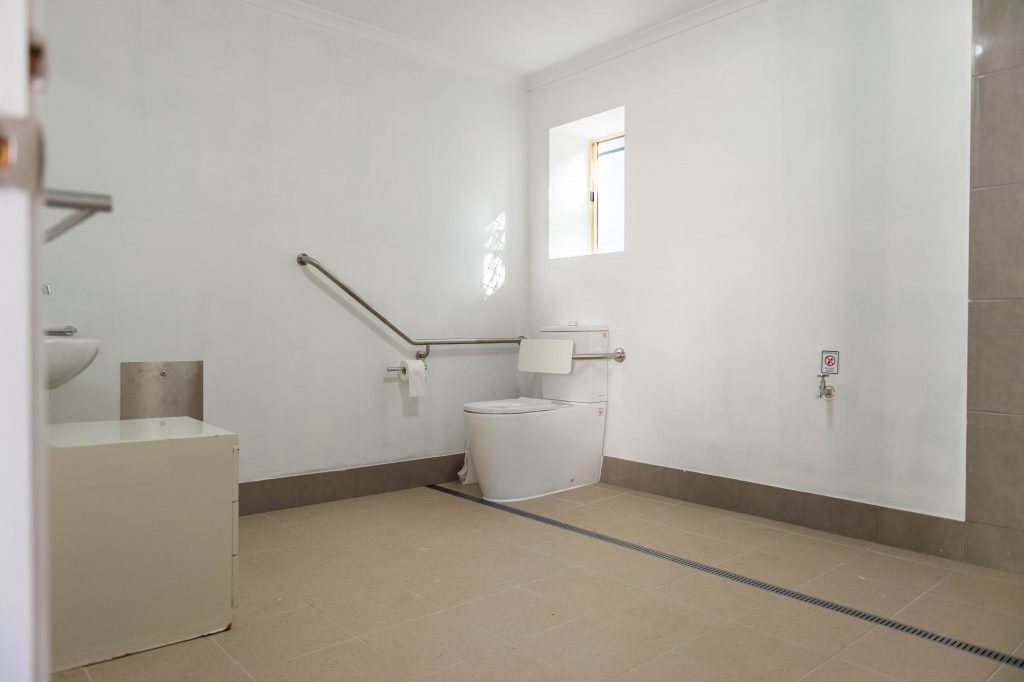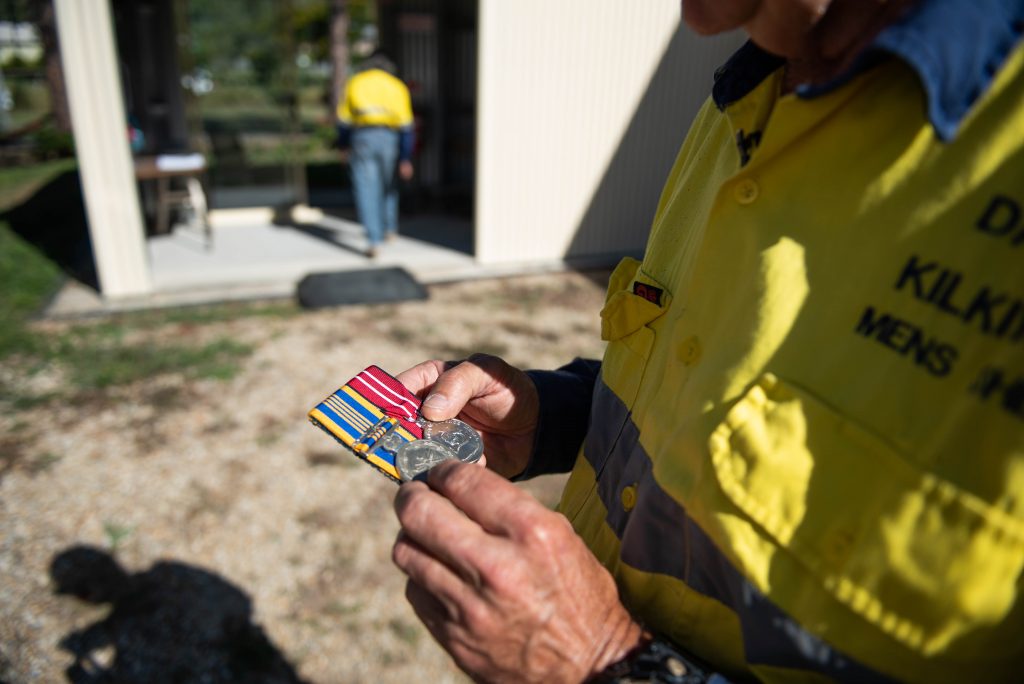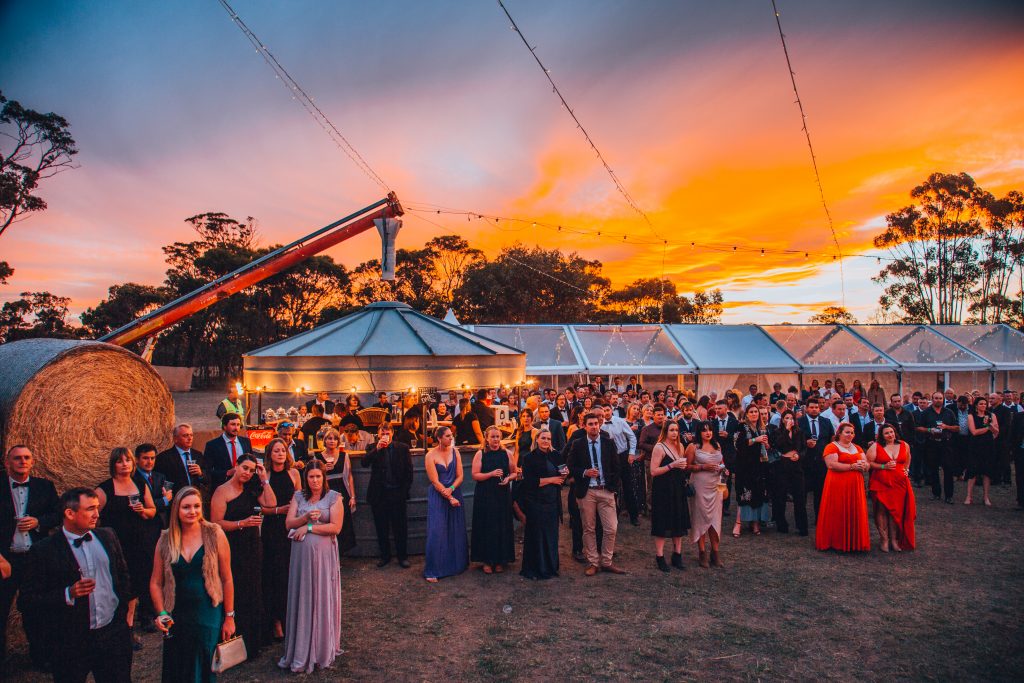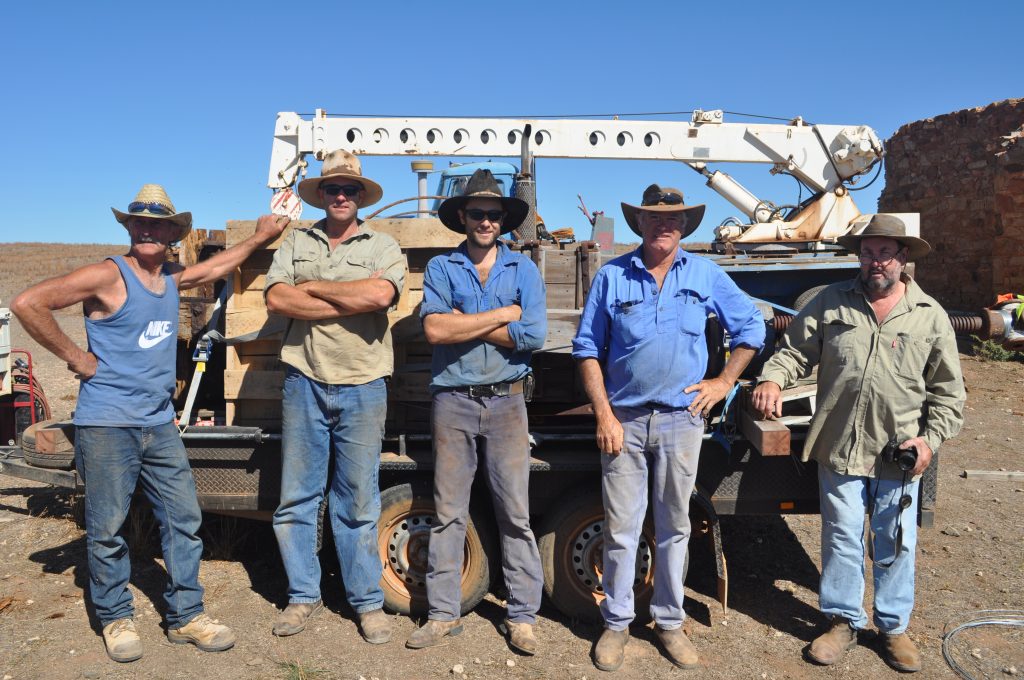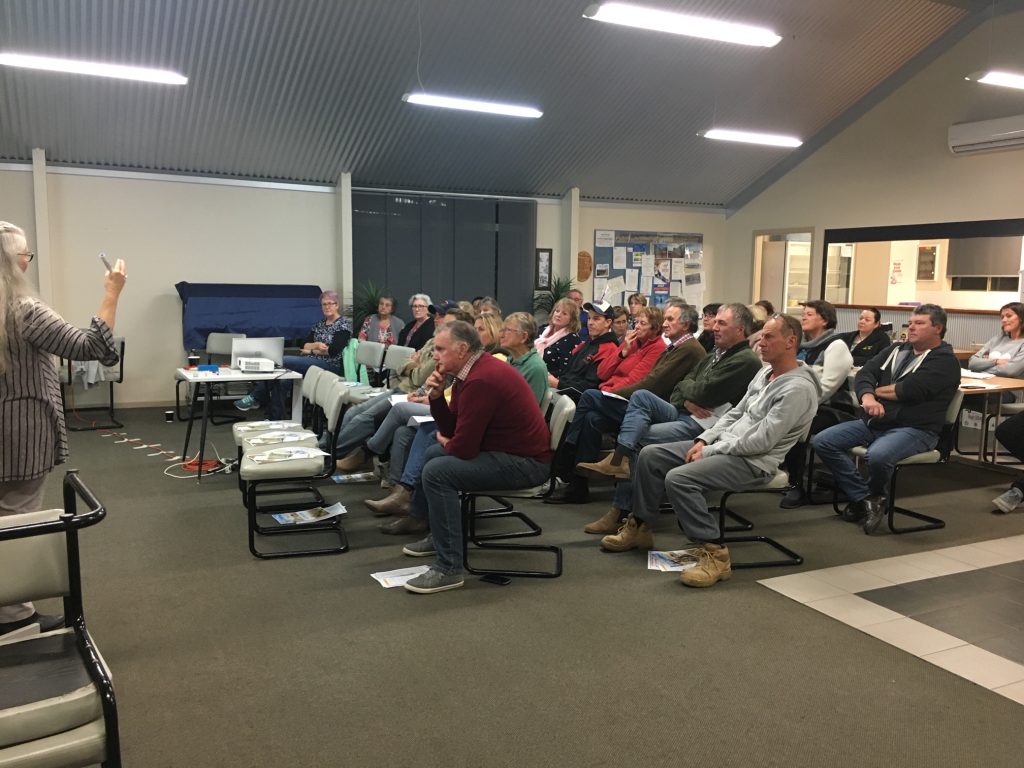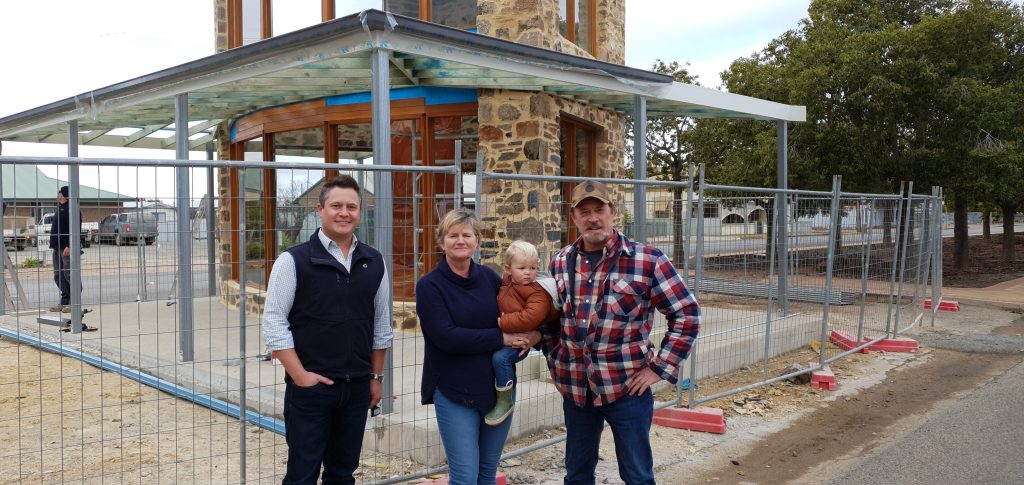Foundation for Rural & Regional Renewal (FRRR)
The small town of Kilkivan in Queensland, 50 km west of Gympie, is served by the hardworking Kilkivan Veteran’s and Community Men’s Shed Association Inc.
Since 2017, the group has been involved in many local projects. They have developed community gardens, managed re-generative tree projects along creek lines (and seen an increase in frog numbers!), and now manage a PA system that is regularly used for community functions, which was funded by an FRRR grant.
Cutting grass, emissions and hassle
The Association, which has seven committee members and 20 volunteer members, also operates the Rural Assist program, the first voluntary support service in the community focused on local seniors. Despite experiencing the effects of drought, the grass still grows and the elderly residents find it difficult to control.
Members are regularly called upon to mow lawns and assist older people with their gardens and, at the time of applying for an FRRR grant, they were set to take on upkeep of the Medical Centre’s grounds. They therefore thought it was about time that they purchased a ride on mower, instead of members using their own equipment!
A recent arrival on the Australian market, the Bushranger E-rider 72V 30″ cut unit was deemed ideal. It is designed for small to medium size areas and can be used by persons with mild disabilities, under supervision.
“This mower would greatly assist us during the summer (wet season) period when the grass grows as you look at it,” wrote Secretary, Treasurer and Founder of the group, David Timperley in the application.
Purchased in April 2020, using a Strengthening Rural Communities grant of $3,699 funded by the Sylvia & Charles Viertel Charitable Foundation, the group has reported the new electric mower is quiet, very easy to operate, and good for safe use around senior residents, who are vulnerable to fumes from petrol driven equipment. They estimate at least 50 seniors will benefit from the purchase.
Meanwhile, progress on the ‘Shed’ continued steadily
The Committee has been diligently working towards having their own Shed for several years. Their vision was that it would provide a space for woodwork, metal work, cooking and other craft activities for both men and women in the area, many of whom feel isolated and impacted by the hardships of continuous drought.
They planned in detail to ensure that the space was inclusive, accessible and useful. In 2020, a grant of $55,105 through FRRR’s Tackling Tough Times Together program contributed to the fit-out of the facility, especially the welfare area.
“It is important for the Kilkivan Veteran’s and Community Men’s Shed through its growth to have its own equipment supported by organisations that can help us in our infancy. Although we have been fund raising over the past 3.5 years we have only just been able to have our shed erected. The town has a high level of seniors in our demographic make up. These seniors are very supportive in the work we are doing and the help we provide, however difficult it maybe voluntarily to provide fit and healthy members. This equipment will allow others under supervision and with disabilities to take part in our activities safely. We thank FRRR and The Sylvia & Charles Viertel Charitable Foundation, Equity Trustees for their support.”
David Timperley, Treasurer and Founder
In mid 2021, we caught up with David and Bella Timperley who gave us a tour of the shed and talk about their experience getting grants and achieving their aims as a not-for-profit community organisation in rural Queensland.
Watch the video below.
Having worked at a community level for 5 years now, most recently as a Program Coordinator and Community Development Officer for Blackall Tambo Regional Council, Jaimee-Lee Prow has experienced first-hand the generosity and good intentions that relief agencies have when it comes to drought in remote, rural, and regional communities. However, these good intentions often don’t translate into practical and accessible support at a grassroots level. Here she shares her story.
To paint a picture of what I mean, I’ll explain a bit about what our experience has been with relief agencies within the central western Queensland drought space. Off the top of my head, I can name at least 20 organisations that offer much the same kind of assistance. This overlapping service provision is driving a state of competitiveness among these organisations and, from a community perspective, has led to a matrix of issues that prevent community groups from taking them up on their offers of assistance. This, on top of a disconnect at a community level, has meant that these relief organisations are actually hindering themselves from reaching the goals that they set out to achieve.
We rural people are a stoic breed. This over-supply of relief support has led to a lot of miscommunication, confusion, and apprehension, resulting in people abstaining from seeking assistance. Or else people become overwhelmingly confused about how to navigate the many systems with most deeming it as an added stress that they simply don’t need. Another familiar scenario is that of individuals, community groups and local-not-for-profits who don’t apply for assistance through one organisation because they’ve already applied for similar assistance through another organisation, and they fear that it will be seen as ‘double dipping’.
Beyond the confusion and burdensome processes, rural communities often feel that these relief agencies fail to properly consider the demographic that they’re dealing with. A large portion of our graziers, primary producers, small business owners and community members are over the age of 65 years with many of them either being extremely hesitant about social media or else completely oblivious to it. Yet, many of these relief organisations use social media as their main tool for promotion and one of their primary platforms for getting information out there. It’s also common that applications for grants will exist predominantly online and even requests for assistance are virtual. As a result, a large portion of our drought impacted population are missing out on the valuable financial assistance offered by the relief agencies. So, a word of advice – this generation still rely on good old-fashioned word of mouth, and mainly prefer to trust “the local bloke”.
Charities, not for profits and non-government organisations can take action to shift from their traditional roles as relief agencies and move towards becoming partners who walk in lockstep with resilient and prepared communities. These relief agencies are, of course, well-meaning but most, if not all of them, are based outside of our region. Some of them even have a strictly virtual presence. Which is why, despite the obvious devastation of drought that surrounds us, they often walk away scratching their heads at the low levels of relief uptake after briefly popping up in our communities. The lack of local coordination and sharing of information on the ground is, ultimately, failing our rural communities.
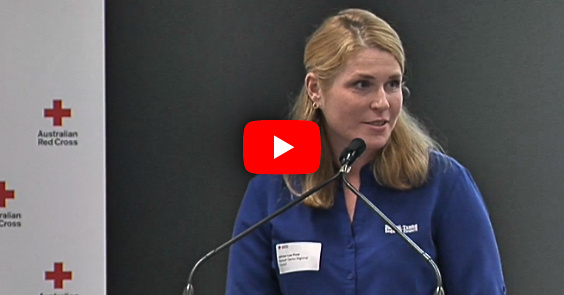
So, how do we fix the problem?
The solutions aren’t necessarily innovative or complex. In fact, they’re quite simple. Below is a list of steps that relief agencies can take to provide effective support to our drought effected communities:
Step one: listen to the locals
As mentioned in the Red Cross Drought Resilience discussion paper, projects and program delivery from organisations need to be locally focused to meet the needs of the region they are working with. When it comes to providing assistance for our communities, blanket approaches simply don’t work and a ‘one-size-fits-all’ solution doesn’t exist.
Step two: we need more than just a plan for the future
We are really at a critical point within the community drought recovery process where we need to keep the momentum going and continue to create or maintain partnerships. Within my local community. I have recognised a shift away from the initial panic and knee jerk reactions to the disaster. Local individuals, groups, businesses, and farms are now ready to accept and explore actions they can take to prepare for future drought- something that wasn’t possible in the initial stages of drought response.
Our initial response was to flood funds upon our drought impacted communities. And this was evident in the amount of overlapping we saw in service provision from our relief agencies. Don’t get me wrong, to a degree we certainly needed it. But what we are starting to see or recognise now is that drought funding is starting to dry up, and services are beginning to wind back in our rural communities. This imbalance between community readiness and resources, and the funding now available is a major concern moving forward. In the disaster recovery and planning phase, we need the resources now more than ever to be ready for next time.
Step three: simple applications and greater flexibility
We need to ensure application processes are simplified and easy to access. This will benefit all sections of the community but is crucial if organisations want their programs to be accessible to applicants aged 65+. Secondly, because each region is different, the criteria grants need to be made more flexible so that projects can be locally defined by the communities themselves and can be used to support a cross section of activities such as infrastructure, events, training, capacity building and network development.
Step four: recognition of the role that local organisations play
Local organisations are the backbone of remote, rural, and regional communities. Therefore, programs need to be modelled around their goals and needs. In order for partnerships to be successful and meaningful to our communities, agencies must be personable within the community, and the program itself must be driven by the community that the agency is working with.
During my time working at Blackall Tambo Regional Council, I have worked closely with FRRR on a number of drought resilience initiatives. FRRR have championed solutions that have been led by our community and that are driven by the needs and abilities of those living in our region. I believe that this approach to disaster recovery is the way of the future.
Step five: events and projects should be led by trusted locals
This is the valuable way to connect, respond, recover and plan ahead. While some are of the belief that the community barbecue or the local arts and cultural workshop are a band-aid solution to relieving the impacts of drought, those from rural communities would actually beg to differ. We come from significantly isolated areas. These types of community events, particularly during drought, are a necessity for creating touchpoints, social check ins, networking opportunities, and they keep our communities connected.
Some of the most brilliant ideas for future proofing and planning are sprouted through general chitchat amongst like-minded people at these types of events. We are already seeing some relief organisations which have come into our region, begin to recognise these events and spaces as the perfect platform for informal networking and building a rapport with our community members. As a result, partnerships have become stronger, and we find that these organisations who take these extra steps have a better understanding of our community’s needs which results in a greater uptake of their services.
Step six: continued government and philanthropic support
As I’ve already mentioned, it’s crucial that relief agencies don’t simply pull the plug and let funding dry up. Our rural communities are now more than ready than ever to prepare and build resilient regions through planning and projects. We just need the continued commitment to fund and provide resources.
Step seven: build local champions
As an NFP, charity and non-government organisation you should be an active collaborator, but you should essentially be led by locals. Start building your local champions in the communities you were working with. They will be your best investment.
Finally, I’ll finish with something I heard once that I believe perfectly sums up the attitude we must approach the future with if we’re going to continue to build prepared and resilient communities: “You don’t need to be strong to survive a bad situation. You just need a plan.”
38 projects will help communities cope with drought
Thanks to FRRR’s Tackling Tough Times Together (TTTT) program, 38 community initiatives in remote, rural and regional communities across Australia will share in $1,316,217. These projects will help local communities tackle the ongoing impacts of drought.
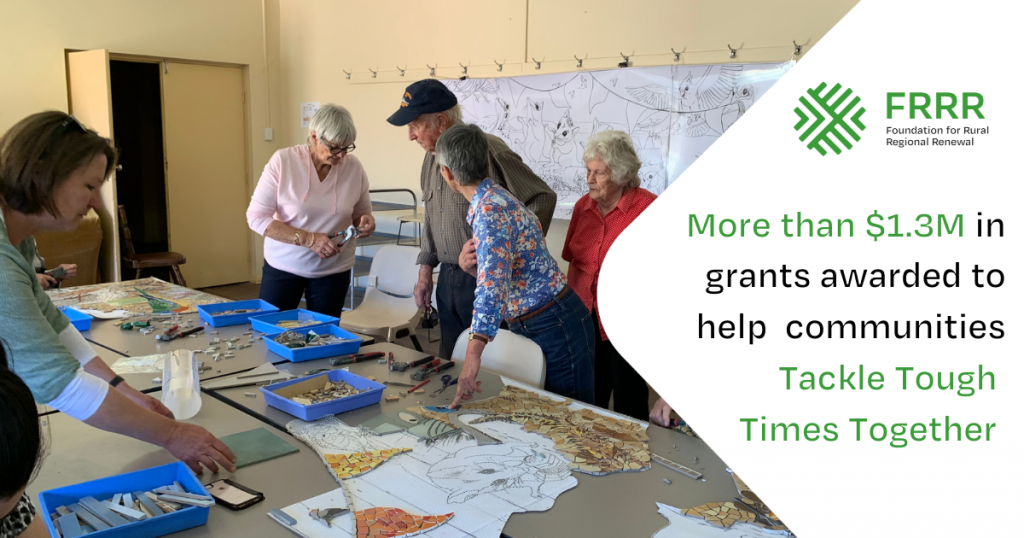
The TTTT program supports drought-affected regions of Australia by giving community groups and local not-for-profit organisations access to the resources they need to respond to, and recover from, long-term rainfall deficiencies. This program has granted over $18 million (through rounds 1-22) to initiatives that are helping communities to tackle the tough times that come with drought.
The program is possible thanks to the support of several donors, including the Australian Government, which committed $15M to be distributed from 2019-2021.
Natalie Egleton, FRRR’s Chief Executive Officer, said these grants will utilise the last tranche of Australian government funding.
“FRRR was grateful to have the support of the Government alongside 15 other donors, as that enabled this program to expand nationally, just at a time when the drought was spreading across the entire country.
“While there have been good rains in places, there are many places that continue to experience severe drought, or are just coming out of drought. Enduring such prolonged dryness is really tough on these communities and their local industries. The pandemic has also meant that many of the fundraising initiatives and events that would normally have brought the community together and injected vital funds into the local economy haven’t happened now for 18 months. As a result, some people are more socially-isolated than ever.
“That’s why we’re so pleased to be able to support these projects at a time when they need it the most. Each of these remote, regional and rural communities has their own complex and individual needs, which is why it’s crucial that their support and recovery efforts are community-led.
“The projects being funded in this round range from investing in infrastructure and building organisational capacity, to providing services and developing skills, which really highlights the diverse range of needs in these communities,” Ms Egleton said.
Among the groups being funded is Parachilna Community Association who are refurbishing a school building, so that it can be used as caretaker residence at the community caravan park. This upgrade to local facilities will help Parachilna to attract tourists, which in turn will help to financially support the community. The $44,643 grant means they can install and renovate a bathroom, kitchen and living room.
Another organisation receiving funding is Pikedale Community Inc for their Drawing Through Drought initiative. This will fund a series of art classes in the rural, grazing community of Pikedale, west of Stanthorpe, which will allow the local community to meet, connect, refresh and ease the stress and mental fatigue caused by the hardship of prolonged drought.
Among the other projects funded this round include:
- Country Women’s Association of NSW, Walgett NSW – Tranquillity – $13,860 – To provide a green space of tranquillity that is accessible by wheelchair. Funds will be used for concreting the disability access and installing a rainwater tank and irrigation system for the garden.
- Cunnamulla & District Show Society Incorporated, QLD – Cunnamulla Show Society Multi-Purpose Function Centre, Stage 2 – $145,000 – The grant will be used to undertake stage 2 of the construction of the new, large multi-purpose function centre at the Showgrounds.
- Friends of Yantanabie Incorporated, SA – Yantanabie Hall Roof Restoration – $17,050 – The project aims to restore the roof of the Yantanabie Hall. A master builder has assessed that these repairs will ensure the structure remains safe for future generations and community use.
- Rupanyup & District Consultative Committee, VIC – Landscaping Rupanyup Community Space – $60,000 – To create a new community space in Rupanyup where community members can gather and relax. Funding will be used to clear the site, prepare garden beds, install access and paths, plant trees and shrubs, install an irrigation system, build seating and pergolas.
- Lake Grace Community Men’s Shed, WA – We Need a Bigger Shed – $60,000 – This will double the members’ workspace by adding another shed to the current one. The increased space will give them separate working areas and the option of including a mezzanine floor and a hoist in the future.
In addition to the Australian government, generous contributions have also been made by The Pratt Foundation, Stockland CARE Foundation, Paul Ramsay Foundation, The Snow Foundation, Tim Fairfax Family Foundation, Henroth Group and private donors from across the nation. To join these donors, and support grants like this through FRRR, you can make a tax-deductible donation at frrr.org.au/giving/.
With recent rains in many areas, FRRR will take the opportunity to review the shape of the Tackling Tough Times Together program in the coming weeks, meaning the next round is likely to open early in the new year.
The full list of grant recipients and their projects are below.
| Organisation | Project | Location | Grant | |||
|---|---|---|---|---|---|---|
| NEW SOUTH WALES | ||||||
| Up to $60,000 | ||||||
| Royal Flying Doctor Service of Australia (South Eastern Section) Contact Inc | RuralCONNECT: Activity Days for Isolated Children and Families in Drought-Affected Areas Support families with young children living in remote north-western NSW by providing opportunities for social and educational participation in creative programs. | Louth | $59,924 | |||
| Up to $20,000 | ||||||
| Country Women's Association of NSW | Tranquility Enhance community well-being and local amenity by providing a green space of tranquility for community use. | Walgett | $13,860 | |||
| QUEENSLAND | ||||||
| Up to $150,000 | ||||||
| Cunnamulla & District Show Society Incorporated | Cunnamulla Show Society Multi-Purpose Function Centre - Stage 2 Support the Cunnamulla and District Show Society Inc's resilience and capacity to contribute to a stronger local economy and an engaged, participative community, through the completion of their multi-purpose centre. | Cunnamulla | $145,000 | |||
| Up to $60,000 | ||||||
| Kingaroy State School Parents and Citizens Association | Inclusive Play and Learning Facilities for Children in Kingaroy Install new play and seating areas at Kingaroy State School, to meet the needs of the diverse children and families in this drought-affected community. | Kingaroy | $60,000 | |||
| Creative Country Association Inc | Murgon's Best Kept Secret Fit out of the Fossil Museum at the Murgon Cultural Centre, to attract tourists and stimulate economic activity in the town of Murgon. | Murgon | $60,000 | |||
| Goombungee Public Hall Inc | Goombungee Public Hall Upgrade Encourage better use of the community hall by repairing the facility to make the community space safer and more user-friendly, thereby securing its use for future generations. | Goombungee | $60,000 | |||
| Mount Morgan Central Primary P&C Association | MMCSS Youth Warriors Course Inspire leadership, confidence and self-discipline in senior students, by installing an Adventure Obstacle Course. | Mount Morgan | $50,732 | |||
| Goondiwindi Pastoral and Agricultural Society | From Storing Outdoor to Making it Secure: Showground Community Storage Shed Reduce volunteer fatigue and build the capacity of Goondiwindi Pastoral and Agricultural Society through the purchase of a storage shed to support community events. | Goondiwindi | $49,033 | |||
| Somerset Regional Council | An Annual Program of Art Making Activities for Children and Young People That Addresses the Impact of Drought, Assists with Recovery and Builds Resilience Through Creative Opportunity and Expression Encourage children’s learning and development with art workshops/creative activities at the Somerset Regional Art Gallery. | Toogoolawah | $47,536 | |||
| Tamrookum Memorial Hall Incorporated | To support the Capacity and Sustainability of Tamrookum Hall with Upgraded and Refurbished Amenities Enhance economic stimulus of Tamrookum and surrounding areas by providing accessible amenities for locals, volunteers, visitors and user groups to use. | Tamrookum | $41,816 | |||
| Toogoolawah & District Progress Assoc Inc | New Canteen with Connection to Water, Electricity and with Shade Protection Increase volunteer safety and comfort at the canteen building which is used by the Toogoolawah Progress Association and other community groups. | Toogoolawah | $36,386 | |||
| Gatton Show Society Incorporated | Gatton Show – Poultry Section WHS Upgrade Reduce volunteer fatigue and support local economic recovery by repairing the Poultry Pavilion, a major attraction at the Gatton Show. | Gatton | $35,478 | |||
| Blackall - Tambo Regional Council | Tambo Dam Lights - Stage 2 - Installation Contribute to local economic recovery by funding the transportation of an art installation on the Blackall Tambo dam. | Tambo | $30,624 | |||
| Balonne Shire Council | Mural of Historic Significance - Balonne Community Hub Contribute to a culturally vibrant community while also supporting local economic recovery during current times of drought and COVID-19. | St George | $30,000 | |||
| Up to $20,000 | ||||||
| Stanthorpe Festival Association Inc | Food & Wine Fiesta Strengthen economic diversity and support cultural engagement by hiring artists to provide entertainment to support the 2022 Stanthorpe Food & Wine Fiesta. | Stanthorpe | $20,000 | |||
| The Texas Historical Society Inc | Texas Technology Museum Build capacity and boost local economy by constructing an exhibition pavilion at the existing Texas Historical Museum with a technology focus, that aims to attract a broader (younger) demographic. | Texas | $20,000 | |||
| Jandowae Timbertown Festival Inc | Jandowae Timbertown Festival Tours, Fireworks and Creative Chainsaw Demonstrations Reduce social isolation and support local economic recovery by adding extra tours/quality demonstrations to the 2022 Jandowae Timbertown festival program and provide night-time entertainment that will attract people to attend the festival and stay longer. | Jandowae | $10,712 | |||
| QCWA Branch Jackson | Making it Easier Reduce volunteer fatigue and build the capacity of the QCWA Jackson Branch Hall through kitchen upgrades. | Jackson | $5,022 | |||
| Pikedale Community Inc | Drawing through Drought Enhance opportunities to participate in creative activities for the Pikedale community through the delivery of four art workshops over a series of weeks. | Pikedale | $4,928 | |||
| Lions Club of Cecil Plains Inc | Shade and Shelter Build capacity by providing shade and shelter for volunteers and the community that attend their events. | Cecil Plains | $3,160 | |||
| SOUTH AUSTRALIA | ||||||
| Up to $60,000 | ||||||
| Lochiel Progress Association Incorporated | Coming Together at the Lochiel Community Centre Re-invigorate the Lochiel Community Centre (LPC) by upgrading the facility, thereby enabling the Centre to host important community get-togethers to increase social inclusion, well-being and resilience. | Lochiel | $59,429 | |||
| District Council of Loxton Waikerie Little Town Productions | SHINE: Riverland Community Light Project Create a community arts event featuring a unique animated projection mapped to the façade of the historic St Peter’s church, and create sustainable creative skills for young people and lift the spirits of the whole community. | Loxton | $55,859 | |||
| Carrieton Progress Association Inc | Carrieton Community Halls Project -'Preserving and Restoring the Town Facilities' Improve the tired infrastructure and reduce community fatigue. | Carrieton | $54,443 | |||
| Parachilna Community Association | Refurbish a School Building at the Community Caravan Park as a Caretaker Residence Build the capacity, capability, and sustainability of the Parachilna Community Association’s caravan park through refurbishing a school building so that it can be utilised as a caretaker residence. | Parachilna | $44,643 | |||
| Foodbank of South Australia Incorporated | Foodbank Ceduna Food Hub - Cool Room Project Increase capacity and capability of Foodbank of South Australia to provide food relief for regional and rural communities impacted by drought. | Ceduna | $25,700 | |||
| Up to $20,000 | ||||||
| District Council of Orroroo Carrieton | 54 31 Collective Boost and strengthen the local economy by providing rural creators a platform to grow and showcase their locally made or sourced products, which will attract visitors/tourists to the region thereby benefiting the wider community. | Orroroo | $20,000 | |||
| Friends of Yantanabie Incorporated | Yantanabie Hall Roof Restoration Improve volunteer vitality and support strong social connection by restoring the roof of the Friends of Yatanabie’s Community Hall. | Yatanabie | $17,050 | |||
| Moorook Hall Incorporated | Safety and Secure Storage - Moorook Community Hall Improve volunteer vitality and support strong social connection by restoring the Moorook Hall. | Moorook | $13,208 | |||
| Rotary Club of Peterborough Incorporate | The North East Drought Event and Inaugural Wool Show Reduce social isolation by facilitating social connection through supporting a Wool Show hosted by the Rotary Club of Peterborough Incorporate. | Yunta | $11,000 | |||
| Balaklava Community Arts Incorporated | Balaklava Community Arts Inc 2022 Production of "Shrek" To foster and encourage the Arts in the local region by staging a performance that will involve locals in many roles as participants but also in attendance at the event. | Balaklava | $5,300 | |||
| VICTORIA | ||||||
| Up to $60,000 | ||||||
| Rupanyup and District Consultative Committee Enterprise Rupanyup | Landscaping Rupanyup Community Space Improve social and emotional health and build resilience in the Rupanyup community by landscaping a community space. | Rupanyup | $60,000 | |||
| Up to $20,000 | ||||||
| Corack Public Hall Inc | Corack Hall Kitchen Makeover Build the capacity, capability, and sustainability of the Corack Public Hall through refurbishment of the Hall’s kitchen. | Corack | $16,500 | |||
| Buloke Women’s Network Inc | Celebrating Buloke Women in 2022 Promote individual and community health and social wellbeing through community events that acknowledge and celebrate the economic and social contribution of women in the Buloke region. | Watchem | $15,900 | |||
| WESTERN AUSTRALIA | ||||||
| Up to $60,000 | ||||||
| Lake Grace Community Men's Shed | We Need a Bigger Shed Improve the Lake Grace Men’s Shed to attract more members, reduce social isolation and improve mental and physical health. | Lake Grace | $60,000 | |||
| Lake Grace Community Resource Centre Inc | Fit For Purpose Support tourism opportunities that will strengthen the local economy through installation of outdoor fitness equipment to encourage motorists to stop and revive. | Lake Grace | $26,683 | |||
| Up to $20,000 | ||||||
| Lake Grace Artists' Group | Comfy Safe Space for Our Community Improve volunteer vitality and organisational resilience to encourage more use of the community Art Space for social and educational participation by providing new chairs, stools and tables. | Lake Grace | $18,788 | |||
| Leeman Green Head Community Resource Centre Incorporated | The Leeman Green Head Community Resource Centre IT Upgrade Improve the Leeman Green Head Community Resource Centre’s (LGHCRC) ability to support and service the community through purchase of IT equipment for the delivery of training and provision of online services. | Leeman | $18,503 | |||
| Katanning Land Conservation District Committee | Katanning - Making the Swap to Green Caffeen Stimulate the local economy through an innovative project that tackles the environmental issue of waste production by removing disposable coffee cups from Katanning cafes through the Green Caffeen system. | Katanning | $9,000 | |||
In this quarter’s update for FRRR’s donor partners, read about:
- Heads up on the findings of the Heartbeat of Rural Australia study
- BE INSPIRED: Thallon ‘back from the brink’
- Donor Spotlight: Pinnacle Charitable Foundation
- Insights from the bush
- Our progress, with your support
- Partnering Opportunity – Supporting volunteers through SRC
- Grants in Action: Bermagui’s collective approach to preparedness
- Community Partner Spotlight: Housing Matters Action Group
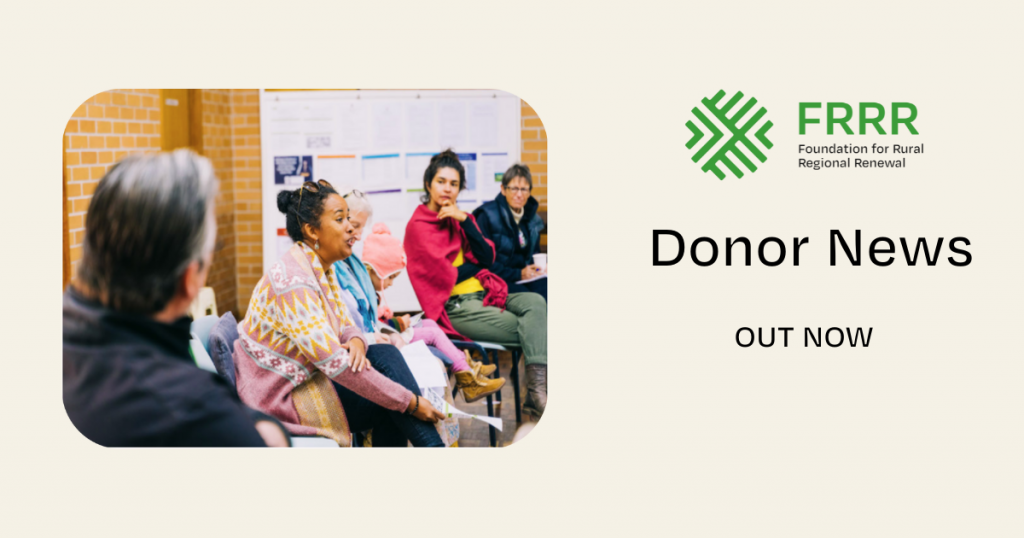
By Nina O’Brien, Disaster Resilience and Recovery Lead
In recent weeks, with funding being awarded through various FRRR programs, we have started to see concepts lift from the page and move into activated ideas. It also comes at a time when intersecting international conversations of climate urgency relating to COP 26 and the IPCC Report feature heavily in our daily media news feeds. So, it is timely to pause, and reflect on the tapestry of drought preparedness and resilience-building activity being undertaken across Australia, and to share some observations.
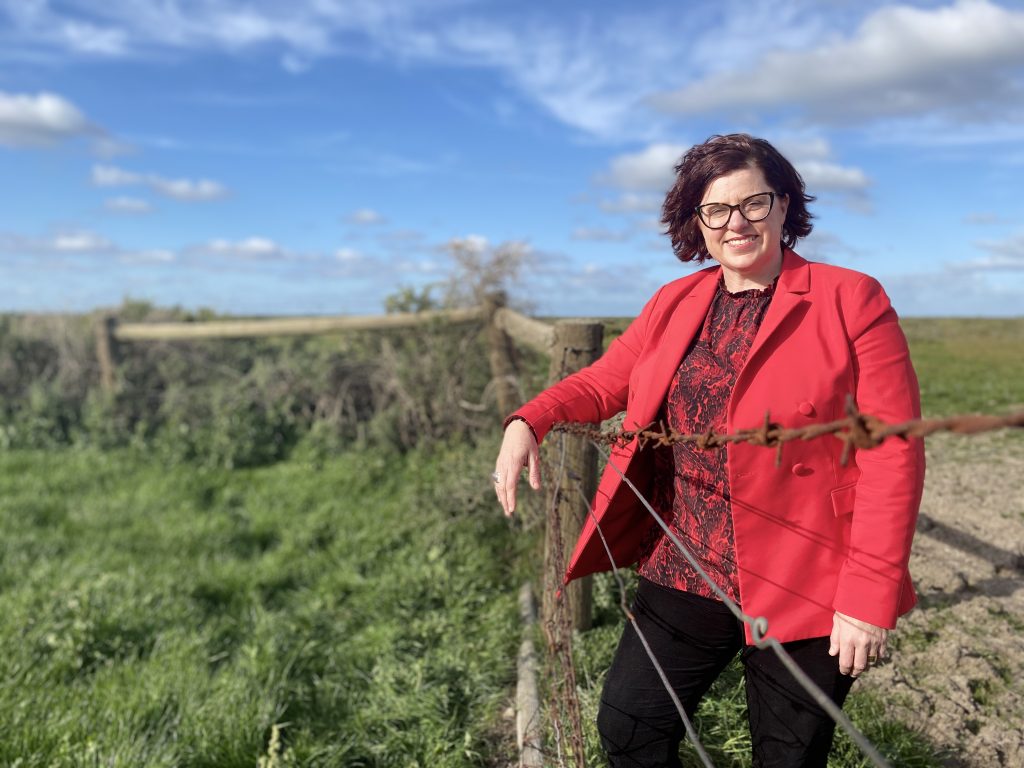
While the future climate challenges are as diverse as the landscapes where they are located; the people and communities of remote, rural and regional Australia are actively engaging in local solutions, decision-making and networking as a means of gaining and sharing the skills and knowledge needed to prepare their community and region for an increasingly drying climate, and sometimes challenge long-held attitudes.
On the national stage, the Rural and Regional Affairs and Transport References Senate Committee recently published its finding into its enquiry on the Federal Government’s response to the drought, and the adequacy and appropriateness of policies and measures to support farmers, regional communities and the Australian economy. In addition, the Australian Government’s Future Drought Fund initiatives are starting to take flight across multiple streams of investment that aim to build an economic, environmental, and socially resilient nation capable of enduring the impact of climate change. At FRRR, part of our challenge is synthesising the international, national, and state contexts with a hyper-local application of understanding and ideas to bring value to local people and places, as we work alongside them to imagine a vibrant future.
It’s our belief that remote, rural, and regional communities have the knowledge to best respond to the impacts of drought, climate change and other natural disasters. So, it has been incredibly heartening to see the diversity of response from communities in building their local networks, capacity, skills, and knowledge to respond to future drought and disaster events.
The first-round of recipients of the Australian Government Future Drought Fund’s Networks to Build Drought Resilience program have elicited a range of interesting patterns across the continent. Among them, and reflective of the increasing part that women are playing in key decision-making roles in rural and regional communities, concepts to build drought resilience locally-devised by women have emerged as a strong theme across multiple states.
A case in point. Although the mean rainfall has been relatively stable across the Eyre Peninsula in the last 30 years, the average days over 38 degrees have increased, and rainfall has decreased in autumn and in the late winter and early spring months, compared to the preceding 30 year period. Against this backdrop, Women Together Learning (WoTL), from Rudall in South Australia, are actively working to building their ambassador network to support women in agriculture through five workshops focusing on future drought, climate projections and the impact on agricultural practices and rural communities. The project involves building the capacity of the WoTL Ambassadors to participate in planning, professional development, and networking.
The project will bring women together, who ordinarily may connect, to form an ongoing future network to build skills, knowledge, and personal connections to be better informed about challenges that the changing climatic patterns presents. With a mean total of 300mm rain per year, planning ahead, and collective problem solving through strong networks will be critical to the region’s success.
On the other side of the country, in a completely different agricultural landscape and climate impact context, is the Northern Rivers Community Gateway Inc who are leading the Women on The Land – Get Ready Empower Yourself Preparedness Workshop Series in Casino, in New South Wales.
This project will deliver five workshops to improve the confidence and reduce social isolation of rural and regional women, while also providing planning and coping tools for the participants to share with their broader networks. Focusing on decision making, preparedness and land management, the workshops will provide a forum to build positive mental health of rural and regional women, while also providing access to service providers and the opportunity to build networks for ongoing cohesion and support.
In another example, the Liebe Group, an active grass-roots grower group from the Dalwallinu region of Western Australia, is also playing an active role in supporting women in drought resilience through their Women In Ag Networking and Diversification (WAND) Program: Strengthening Social Connection and Farm Business Resilience. Importantly, this project will host onsite field visits and an agricultural show day to provide participants with future planning knowledge for below-average seasons and increased business acumen to adapt to the negative effects of drought. Through the project, the local women in agriculture involved in the projects will build capacity and resilience, as well as regional networks to respond to the impacts of drought, both socially and on their farm businesses.
The strength of these projects lies in the hyper-local but interconnected structure of these projects, as affirmed by the recent research commissioned by FRRR that indicates:
‘Resilience is not something that individuals or communities can achieve on their own. It is achieved through the combined and intersecting structures, processes, formal and informal networks and supports in communities working together. What we see as individual or community resilience is part of and supported by a collective effort by agencies, organisations, community groups, business and community members.’
We look forward to continuing to support groups like these, as they identify the most appropriate responses to these ongoing challenges, and equally take advantage of the opportunities that will no doubt emerge, as they strive for a vibrant and sustainable communities.
FRRR has awarded $1,413,319 to 33 remote, rural and regional communities across Australia for locally-led initiatives that will help build their region’s resilience to drought.
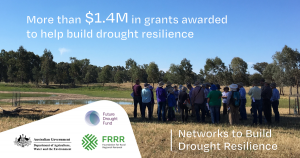
Funded by the Australian Government’s Future Drought Fund and a range of other donor partners, the Networks to Build Drought Resilience program focuses on strengthening social connectedness, building social capital and funding transformative local initiatives that will enable agricultural communities to be more prepared for the impacts of drought.
The grants, which range from $10,000 to $139,000, were awarded to local groups to support community projects such as events that will bring people together, training that will increase knowledge and skills, and infrastructure that will facilitate and enable networking.
Natalie Egleton, CEO of FRRR, said that when it comes to building drought resilience, resourcing initiatives that enhance social connectedness and networks is more crucial than ever.
“Rural communities are typically pretty self-reliant, and depend on being able to come together and work as a community to prepare for and respond to most challenges. That includes building resilience to respond to the changing climate, and this round we saw some great projects and initiatives that will strengthen resilience and respond to local needs.
“With many of these rural communities impacted by COVID-19, plus drought, fires, and for many the mouse plague, local fundraising has been even more difficult than usual. So it’s wonderful to be able to offer the support these places need to strengthen community connectedness and build their networks.
“We’re grateful to be partnering with the Australian Government, and to have the support of our other donor partners, because it allows us to back these grassroots organisations who are making significant strides when it comes to preparing their communities for future drought,” said Ms Egleton.
Some of the 33 initiatives funded include:
- Women Together Learning (WoTL Ltd) – Rudall, Cowell, Karoona, Pinnaroo, SA – Building the WoTL Ambassador Network to Support Women in Ag – $29,625 – Building the WoTL Ambassador Network to support women in agriculture through a series of workshops.
- Bundaberg Fruit & Vegetable Growers – Bundaberg, Gayndah, QLD – Connecting Producers with an Invisible Support Network – $16,200 – Build capacity among growers for training in mental health and wellbeing and to access local support services through a series of BBQ workshops.
- Gippsland Agricultural Group, Bairnsdale, VIC – Gippsland Connect and Prepare Field Days – $50,000 – Increase community connection and networking activities through the delivery of field day events and installing an accessible ablution block.
- FarmLink Research Ltd, Temora, NSW – Improving Young Farmer Mental Resilience in Times of Drought – $10,000 – Expand capacity for resilience through an interactive seminar.
- The Liebe Group Inc – Dalwallinu, Mingenew, Dandaragan, WA – Women in Ag Networking and Diversification (WAND) Program: Strengthening Social Connection and Farm Business Resilience in the Regional Agricultural Community – $13,100 – Foster increased business acumen in drought resilience through the delivery of workshops.
MEANWHILE, Applications are currently open for Round 2 of the Future Drought Fund’s Networks to Build Drought Resilience program. To be considered, they must be received by 15 November, with funds announced late February. Projects must be completed by 29 August 2022. Learn more at www.frrr.org.au/FDF
The full list of grant recipients and their projects are below.
| Organisation | Project | Location | Grant | |||
|---|---|---|---|---|---|---|
| NEW SOUTH WALES | ||||||
| Funding Tier 1: $10,000- $20,000 | ||||||
| The Australian Landscape Science Institute Limited | Reading Your Landscape This project will bring local landholders together to study and discuss innovative agricultural practice solutions in two field days and a series of webinars, to manage agricultural dependent regions that are vulnerable to accelerating climate impacts. Through the workshops, participants will be encouraged to network and share ideas about Climate Resilient Landscape practices, and be supported by online webinars with a wider audience. | Bungonia | $18,270 | |||
| Monaro Farming Systems CMC Incorporated | Monaro Seasonal Outlook - Building Drought Resilience and Preparedness This project will host a Field Day in the Monaro region that includes a seasonal outlook presentation and discussion around the Farming Forecaster tool that helps farmers make informed decision to improve drought preparedness in changing climatic conditions. Facilitated discussions and reflections from past experiences will improve collaboration across the local farming network, building knowledge about drought preparedness and an understanding of the risks posed by drought and climate change, to build strategies for farmers and local communities to prepare for future droughts. | Cooma | $16,700 | |||
| Northern Rivers Community Gateway Inc - Women on The Land - Get Ready Empower Yourself | Women on The Land (WoTL) Preparedness Workshop Series This project will deliver five workshops to improve the confidence and reduce social isolation of rural and regional women, while also providing planning and coping tools for the participants to share with their broader networks. Focussing on decision making, preparedness and land management, the workshops will provide a platform to discuss mental health issues of rural and regional women, while also providing access to service providers and the opportunity to build networks for ongoing cohesion. | Casino | $14,289 | |||
| FarmLink Research Ltd | Improving Young Farmer Mental Resilience In Times of Drought This FarmLink project will host an event for Young Farmers to build the skills and networks required to manage the impacts of stress during drought, intergenerational relationships and communicating effectively within family farm businesses. The interactive workshop will bring together young farmers and experts in rural and regional resilience and mental health. Through facilitated discussions, the project will build awareness in practical on-farm strategies that improve the participants' capability to manage the stresses associated with drought and climate change in preparing for the future. | Temora | $18,096 | |||
| Murdi Paaki Regional Rugby League Council Incorporated trading as Creative Community Concepts | CCC Community Wellbeing Project This project will improve community resilience through education and mental fitness sessions in schools, and a community dinner, to build wellbeing strategies and mental resilience across local schools and the community. The workshops will build community spirit, bringing the community together to discuss strategies to prepare for difficult times and the impacts of adversity. | Gulgong | $10,000 | |||
| Funding Tier 2: $20,000- $50,000 | ||||||
| Glenrac Incorporated | Resilience, Capacity and Community Connection - Glen Innes NSW This project will support several activities to build resilience, capacity, and community connection across the Glen Innes district including monthly focus evenings, a gardening weekend and informal events that encourage participation and discussion across the community. This project will link into other programs that GLENRAC deliver on benchmarking natural capital, carbon footprint accounting and climate change resilience to build a broader skillset for the participants and the community. | Glen Innes | $49,870 | |||
| North Coast Regional Landcare Network Inc | Partnership Development Officer for NCRLN The North Coast Regional Landcare Network in NSW project will support 11 local Landcare networks, facilitating community connection and knowledge sharing across the groups, as well as increasing opportunities for these participants, and the wider regional Landcare network, to participate in networking events to build a shared understanding of the risks posed by drought and climate change in the local region, while also providing the communities with an opportunity to work collaboratively to solve problems common regional issues. | Lismore | $50,000 | |||
| Funding Tier 3: $50,000 - $150,000 | ||||||
| Western Plains Regional Development Inc | Shoring Up Community This project will give local community groups the much-needed opportunity to hold meetings and get together as they prepare for future drought. Understanding the importance of the community hall for social and professional gatherings, this project will support the upgrade of the community hall to enable it to be used year-round for community gatherings, enhancing social connectedness and wellbeing in the community. | Condobolin | $110,000 | |||
| Riverine Plains Incorporated | Enhancing Community Networks for Drought Resilience In the Riverine This project will deliver 30 workshops within the region to connect primary producers, landholders, and Indigenous custodians to build capacity and share knowledge to address the challenges of future drought and climate change conditions. The project will result in increased social connection in local networks and improved future coordination and collaboration between social networks, other community organisations and sectors in the local communities, sharing knowledge to build more resilient communities across the region. | Berrigan & Greater Shepparton | $102,300 | |||
| SOUTH AUSTRALIA | ||||||
| Funding Tier 1: $10,000- $20,000 | ||||||
| Upper North Farming Systems | Tools, Tech and Transformation – UNFS and Its HUBS 2022 This project will deliver a 'Tools, Tech and Transformation' workshop for farmers and agri-business followed by a series of nine Hub events to provide an opportunity for participants to network and share information to build their knowledge about drought resilience through learning about new farming systems and techniques to manage in a changing climate. | Orroroo | $20,000 | |||
| Funding Tier 2: $20,000- $50,000 | ||||||
| WoTL Ltd | Building the Women Together Learning (WoTL) Ambassador Network to Support Women In Ag This project will deliver five workshops focussing on future drought, climate projections and the impact on agricultural practices and rural communities, and support the Women Together Learning (WoTL) Ambassadors to come together for two days to participate in planning, professional development, and networking to enhance their skills to support the broader network. The project will bring women together that ordinarily may not link up and form an ongoing future network, addressing the needs of rural women in preparing for future drought, and support network for better preparedness. | Rudall | $29,625 | |||
| Coorong District Council | Resilient Farmer Networks Building an Understanding of Managing Soil Carbon and Livestock Methane Production, Seasonal Climate Variability, and Seeking Opportunities In Times of Drought This project will increase opportunities for a diverse group of people and communities to participate in networking through the facilitation of four workshops across the Coorong and Tatiara Districts. The workshops will build farmers' knowledge and understanding of the risks posed by drought and climate change, through the sharing of specialist knowledge in the areas of climate trends, soil carbon, and livestock methane. Through these workshops and networking events, a positive community culture will be built working together to build the community's capacity to respond to change and capitalise on opportunities. | Jabuk | $31,000 | |||
| Funding Tier 3: $50,000 - $150,000 | ||||||
| Mackillop Farm Management Group Inc | Limestone Coast Women In Ag Network This project will increase the resilience of women in the Limestone Coast region of SA to assist preparing for future drought through the delivery of four workshops for women in agriculture across the southeast region of SA. The project will also connect seven regional organisations and build linkages between these local groups to a state-wide organisation, resulting in broader reaches across the state. The network will provide lasting support and increased social connection for the group members across the Limestone Coast region. | Padthaway | $70,817 | |||
| Southern Cross University | Building Drought Resilience In Agriculture-Dependent Communities Through Mapping Young Farmer Information and Support Networks In this partnership project between Southern Cross University and Agricultural Innovation & Research Eyre Peninsula, a new 'network mapping' tool will be used to provide a detailed understanding of the Eyre Peninsula young landholders knowledge network. The project will support the agricultural dependent community of the Eyre Peninsula to build drought resilience by identifying and implementing context-specific strategies through workshops and mapping. Local champions will share key knowledge with young landholders to enhance networking opportunities around drought-resilient practices. | Wudinna | $77,163 | |||
| The Flinders Ranges Council | Quorn Quandong Festival This project’s two-day community event will bring expert speakers to present on the impacts of drought and climate change on the region to highlight the importance of forward planning and preparedness. The event will also encourage participants to be involved in the activities and network to share knowledge, while also creating an awareness of agri-food systems opportunities by showcasing opportunities and benefits offered to agricultural businesses through diversification into production of 'bush foods' and use of Indigenous species, as an alternative to traditional practices to build drought resilience. | Quorn | $139,000 | |||
| QUEENSLAND | ||||||
| Funding Tier 1: $10,000- $20,000 | ||||||
| Destination Scenic Rim Inc | Scenic Rim Round-Up The Destination Scenic Rim (DSR) project will build drought resilience and build social connection through the hosting of four events with keynote speakers across the region that will link location specific community groups, businesses, and organisations to increase collaboration and membership across the region. Held in population hubs of Beaudesert, Boonah, Tamborine Mountain, Canungra and several smaller centres, the events will bring community members together with a shared sense of purpose with an aim to increase the community's economic development and diversification. | Boonah | $12,000 | |||
| Macintyre Ag Alliance Inc | Regenerative Ag Event for Adaptable & Thriving Futures This project’s two-day event at farms across the Western Downs will provide collaborative events and opportunities to learn about new agricultural approaches to build drought resilience practices into the regional agricultural businesses and communities. Through integrating local networks with established, broader networks, the project aims to increase the social connection, networks, and capacity of landholders for best practice farm management and create drought resilient communities. | Roma | $17,188 | |||
| Red Earth Community Foundation South Burnett Limited | Red Earth Community Foundation Leadership Forum Supporting young people to respond to challenges and encourage leadership, the Red Earth Community Foundation (RECF) will host a Leadership Forum to bring together community leaders in the Burnett Inland to connect individuals, groups, and businesses. Through forum sessions, the participants will build leadership skills and form partnerships to assist the region adapt and transform to meet challenges the region will face in a changing climate. The forum will build social connectedness for the region, extend networks and create a shared sense of purpose and community belonging. | Murgon | $18,524 | |||
| Bundaberg Fruit and Vegetable Growers | Connecting Producers with an Invisible Support Network This project represents a progressive opportunity to build capability of professional, social and community networks of producers in the Bundaberg region and build long term drought resilience and social wellbeing across the network. The project will support ongoing networking opportunities, including through initial activities including two Accidental Counselling training sessions and host two informal producer BBQ's to create a network of industry representatives who are able to recognise signs of stress and access local support services for local growers to support mental health and wellbeing. | Bundaberg | $16,200 | |||
| Funding Tier 2: $20,000- $50,000 | ||||||
| GroWQ | Resourcing and Supporting GroWQ This GroWQ Project will deliver two networking events: an Ag Industry Round Table facilitating collaboration and enabling access to support in both health services and agricultural services; and a Technology showcase on innovation and business resilience in the agricultural sector and the wider community. Industry insights provided through the workshops will increase participant knowledge and understanding of the risks posed by drought and climate change, providing participants with the knowledge and tools to share with their communities to respond to a changing climate. | Longreach | $44,000 | |||
| Lockyer Valley Growers Inc | Lockyer Agriculture Resilience and Connection (LARC) Project This project will bring local growing groups together in two seminars to discuss the impacts of climate change and drought on the region, as well as publications in local magazines about local issues and identifying local practices used to manage the impacts of drought. The project will also facilitate training of committee members in governance training to support their organisation to continue to support the broader grower network. Through the involvement of around 200 producers and land managers across the region, the project will enhance networking and knowledge sharing, building a greater culture of connection across the region. | Gatton | $22,815 | |||
| Longreach Regional Council | Creating Sustainable Communities 'In the Bush' This project will facilitate four community workshops and events across issues relevant to different sectors of the Longreach community including youth issues, women's, business and work topics. Workshops through the project will facilitate local networks, increase business planning knowledge and skills, encourage social connection and ensure access to support services to build resilience and future drought preparedness in the local region. | Longreach | $32,500 | |||
| Northern Gulf Resource Management Group Ltd | Croydon Shire Food Security Project The project will establish a community-led steering group through a central co-ordinator to build a food security strategy for the region. The project will increase community engagement, a shared sense of purpose and collaboration between social networks and sectors in local communities, bringing groups together to share knowledge to build strategies to address food insecurity issues in the local area. | Croydon | $37,125 | |||
| VICTORIA | ||||||
| Funding Tier 1: $10,000- $20,000 | ||||||
| Wairewa Public Hall & Recreation Reserve | Supporting Future Community Networking Opportunities This project will provide essential support to community groups in the Wairewa region to network in the lead up, during and after future drought, through the improvement of the public hall as an ongoing social meeting place to build community connection and engagement. Upgrading the hall's kitchen and flooring will enable the local community and farmers to socially connect, as well as engaging with neighbouring communities, thus building a wider social network and community wellbeing through a common functional meeting space. | Wairewa | $14,509 | |||
| Charlton Neighbourhood House Inc | Buloke First Peoples Art Trail Understanding the need for a year-round meeting place to build community wellbeing and a place for engagement, particularly during times of drought, this project will develop an open-air, self-guided Bush Tucker Garden that tell the stories of the local Djaara people and walking trail along the Avoca River that include First Nations Artworks that tell stories of the impacts of a changing climate and times of drought in the Charlton and Buloke area. Through the community’s involvement in the development of the garden and walking trail, the project will build a shared sense of community belonging in the area. | Charlton | $21,000 | |||
| Funding Tier 2: $20,000- $50,000 | ||||||
| Mallee Sustainable Farming Inc | Creating an Online Learning Community to Help Farmers Manage Soil In Drought This project will create a new online learning community and network to help Mallee broadacre farmers prepare for future drought. The network will draw on the latest evidence-based information and resources on how to protect, manage and repair soils before, during and after drought. The project will deliver online learning to increase knowledge sharing and capacity of farmers to access local soil resources and peer forums to build drought resilience. Through joint learning and support, participants will build professional and social networks, sharing information to build an understanding of and resilience to the impacts of future droughts on the region’s soils. | Mildura | $44,290 | |||
| Birchip Cropping Group Inc | Filling the GAPP – A Forum for Future Farmers This project will involve two core activities: the first is a GAPP (Growth, Adoption, Production and Profitability) regional event for new generation farmers titled ‘Filling the GAPP, a forum for future farmers'. The second activity being a round of seven locally focussed production and business resilience focussed discussion group meetings, targeting new generation, early career farmers and supporting agribusiness personnel, to facilitate the opportunity for early career professionals to exchange ideas on farming business practice and provide communities an opportunity to work collaboratively to solve problems, building capacity and leveraging the wider Birchip Cropping Group network of industry connections to build local drought resilience. | Birchip | $49,500 | |||
| Gippsland Agricultural Group | Gippsland Connect and Prepare Field Days This project will increase community connection and networking through two farmer field days, bringing together local farming and community groups to discuss issues prevalent in the region. The project will increase the capacity to use this site for educational, social and networking activities for the agricultural community through the installation of an ablution block at a site frequently used for social and professional networking events, thus increasing the region's ability to support educational, social, and networking activities in the agricultural community and benefit many groups across East Gippsland. | Bairnsdale | $50,000 | |||
| Funding Tier 3: $50,000 - $150,000 | ||||||
| AgBiz Assist Limited - Ovens Murray AgBiz Alliance | Using Tech to Connect, Mitigate and Manage Drought In North East Victoria This project will bring people together informally in a series of meetups and dinners for those involved in agriculture, food and fibre, as well as a regional website to showcase agriculture, food and fibre information and newsletters and podcasts with information on provider networks across the region, providing a tool for connection and accessing regional services. Through the project, the region will have avenues to sustain community engagement and improved coordination and collaboration between social and professional networks. | Tallangatta | $81,400 | |||
| WESTERN AUSTRALIA | ||||||
| Funding Tier 1: $10,000- $20,000 | ||||||
| The Liebe Group Inc | Women In Ag Networking and Diversification (WAND) Program: Strengthening Social Connection and Farm Business Resilience in the Regional Agricultural Community This project will host onsite field visits and an agricultural day show to provide participants with future planning knowledge for below-average seasons and increased business acumen to adapt to the negative effects of drought. Through the project, the local women in agriculture involved in the projects will build capacity and resilience, as well as regional networks to respond to the impacts of drought, both socially and on their farm businesses. | Dalwallinu | $13,100 | |||
| Funding Tier 2: $20,000- $50,000 | ||||||
| Southern Rangelands Pastoral Alliance Inc | Rehydrating the Southern Rangelands of WA This project will bring together farmers to learn about drought resilience issues that are common across the Southern Rangelands area of WA. The project will bring together a farming network, for participants to build the confidence and capability to change historical management practices to restore, repair and improve management approaches in the Southern Rangelands. Through the workshops, the farming network developed will share approaches and support to continue managing the Rangelands in the changing climatic conditions. | Yalgoo | $38,740 | |||
| Shire of Ravensthorpe | Hopetoun Community Networking Support The project will establish the connections to support networks to better connect with community members. The installation of an electronic noticeboard at the Hopetoun Community Resource Centre is to provide critical community and climate information, and promote events to build information sharing and community connection. The project will result in a coordinated and time effective response to disaster preparedness and drought resilience for the local community. | Hopetoun | $39,298 | |||
| Funding Tier 3: $50K - $150K | ||||||
| Wheatbelt Natural Resource Management Incorporated | Talkin' Soil Health - for Drought Resilience This project will connect a network of farmers, farming advisors and support services to an awareness of local support avenues. The Talkin’ Soil Health Conference will focus on building capacity in the WA farming community to address climate challenges with adaptive technology. An on-farm workshop, podcasts and a Community of Practice will extend networking between participants, resulting in an active network of farmers, farm advisors, support services and researchers to build capacity and awareness of local industry support to share knowledge, skills, and tools to build drought resilience. | York | $104,000 | |||
Koreng Country
It is a narrative that we so hear often in many remote, rural, and regional communities across the country. Severe weather that can cause drought, flooding, fires, and frost decimating crops and livestock in areas that survive on the agriculture industry. Major events like drought can affect farming regions for years and in doing so cause the residents of these towns extreme stress and anxiety.
In the town Jerramungup in Western Australia, they too are familiar with this narrative. For the past four years, this farming community has endured particularly dry seasonal conditions. With little rainfall and severe wind events, frosty winters and at least four fires, the soil conditions have been left bare and exposed, meaning farmers have struggled to earn an income. To add to the stressors, due to their deteriorating financial situation, many producers were forced to sell off a large majority of their sheep and cattle flocks.
These cumulative disasters seriously affect the mental health of those trying to maintain an income through farming. This current situation has caused many families to leave the town, causing higher rates of social isolation.
With this knowledge, the Fitzgerald Biosphere Group (FBG) took it upon themselves to create an event where residents could come together and “take a night off”. Since their inception in 2002, the FBG has been active facilitators of natural resource management projects including, strategic control of priority weeds, biodiversity conservation, on-farm trials, and sustainable agriculture climate adaptation. They have often held informative and educational events, but after the success of the 2019 Dancing in the Dirt Gala Ball, they knew it was important for the community to make sure it went ahead again in 2020.
With a $5,000 Strengthening Rural Communities (SRC) grant jointly funded by the Bertalli Family Foundation and FRRR, the FBG was able to cover the fees for the live entertainment. The 300 guests in attendance were treated to a night of music from a live band and a much-needed laugh from a comedian.
The FBG was pleased to report the complete success of the night. It was able to bring the adults of the town together for a night of fun and connection. It was so popular they needed to hire an extra bus to transport the guests safely to and from the event. When asked what they would do differently next time, they said they would have more people working to accommodate the popularity of the event.
“Dancing in the Dirt achieved everything we had hoped – and more. Our little town was buzzing with excitement in the lead up to the event, it took our minds off the past few difficult seasons and gave our town a fresh focus and outlook on the season to come.”
Jessica Bailey, FBG Administration Officer
Ngadjuri Country
The small agricultural township of Orroroo in South Australia knows what it’s like to suffer through drought. With several local businesses closing down and the community running the taxing gamut of drought-related issues, something different needed to be done.
Fortunately, this small outer regional area has a dedicated group of people who are behind the push to ensure the town’s survival, by celebrating and showcasing Australia’s pioneering agricultural history. In the past, the area has relied heavily on a thriving agricultural foundation, but they saw the need to improve their economic diversity, starting with a new tourist attraction.
Over the past few years, the District Council of Orroroo Carrieton, the Orroroo Regional Tourism Group and a team of amazing volunteers have dedicated themselves to very carefully restoring the locally-famed Black Rock Woolpress – a generously donated, circa 1850s piece of manual machinery, which early research suggests may very well be the only one of its kind left in existence.
Plans for the impressive woolpress to be showcased in its very own building in the main precinct of Orroroo came a step closer to reality, thanks to a $20,000 grant from FRRR’s Tackling Tough Times Together program, funded by the Australian Government.
The grant allowed for a formal business plan to be drawn up by a local consultant, confirming the feasibility of the Heritage Hub project. The plan required input from all areas of the community – those working on the project directly, as well as in the wider community motivated to create an attractive tourist destination. As well, the funds were put towards the planning, architectural drawings and raw materials needed to construct the purpose-built rotunda for the Black Rock Woolpress.
This seed funding enabled the planning committee to produce a proof of concept, which attracted $143,252 in further funding from FRRR’s Tackling Tough Times Together program, again funded by the Australian Government, along with grants from the Australian Government’s Local Roads and Community Infrastructure program and funding from the local Council.The stone and glass rotunda now houses the historic woolpress (circa 1851) as the centrepiece in a collection of heritage items on display as part of a landscaped Heritage trail in the town’s centre, with impressive interpretive signage, maps and promotional material. The FRRR grant also contributed to the official launch of the development, which recognise the generous funding organisations and the thousands of hours of volunteer involvement in restoring the woolpress.
District Council of Orroroo Carrieton community project officer Jodie Boully said “We have already had so many locals and visitors stop to comment how impressive the building is.
“It’s been such a huge success to date, a great story of local volunteers who have remained involved in the planning right the way through to highlight some of our early pioneer history.”
The project to create such an attractive tourist destination has already created strong bonds, with those in the community dedicated to seeing the town succeed despite the drought. They have self-funded, committed hundreds of hours of volunteered hours, and worked tirelessly together from the very beginning developing not only the beginnings of a beautifully built tourist hub, but a sustainable and diverse economic platform for the town to rebuild from.
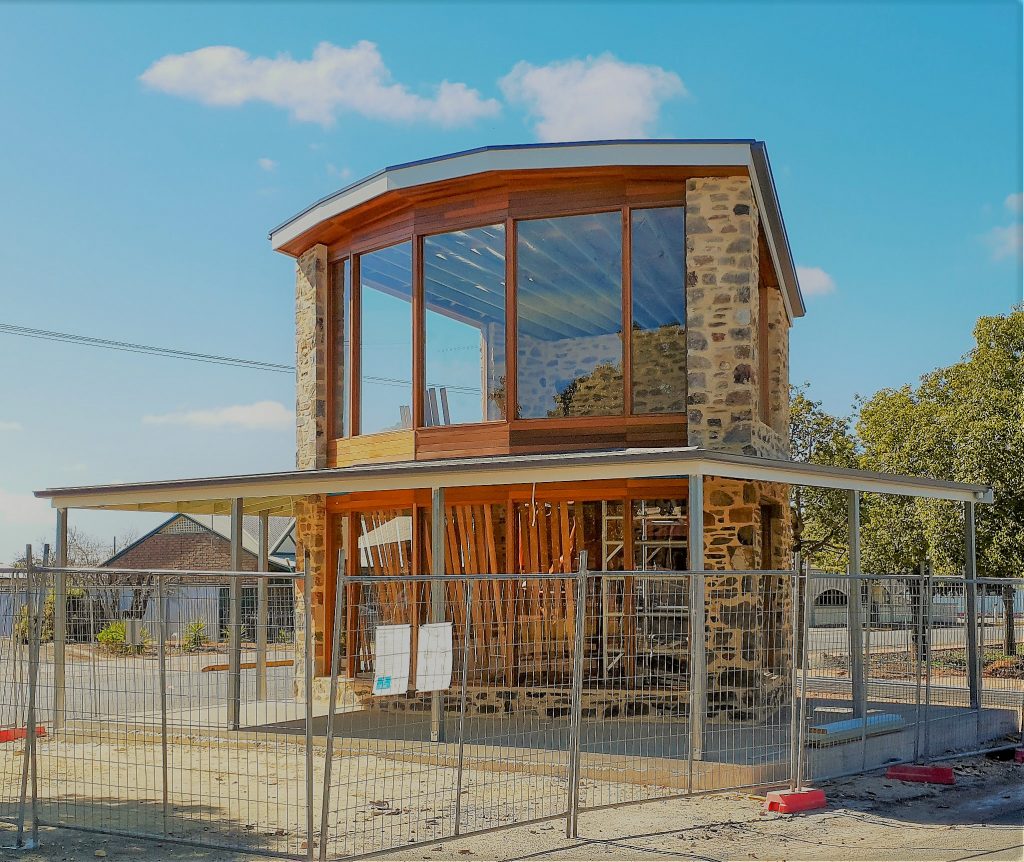
$2.9M in grants available for remote, rural and regional communities
FRRR is inviting applications for the second round of the Future Drought Fund’s Networks to Build Drought Resilience program. These grants are specifically intended to ensure community-led initiatives and rural not-for-profits (NFPs) in agriculture-dependent communities have the support they need to build resilience against future droughts.
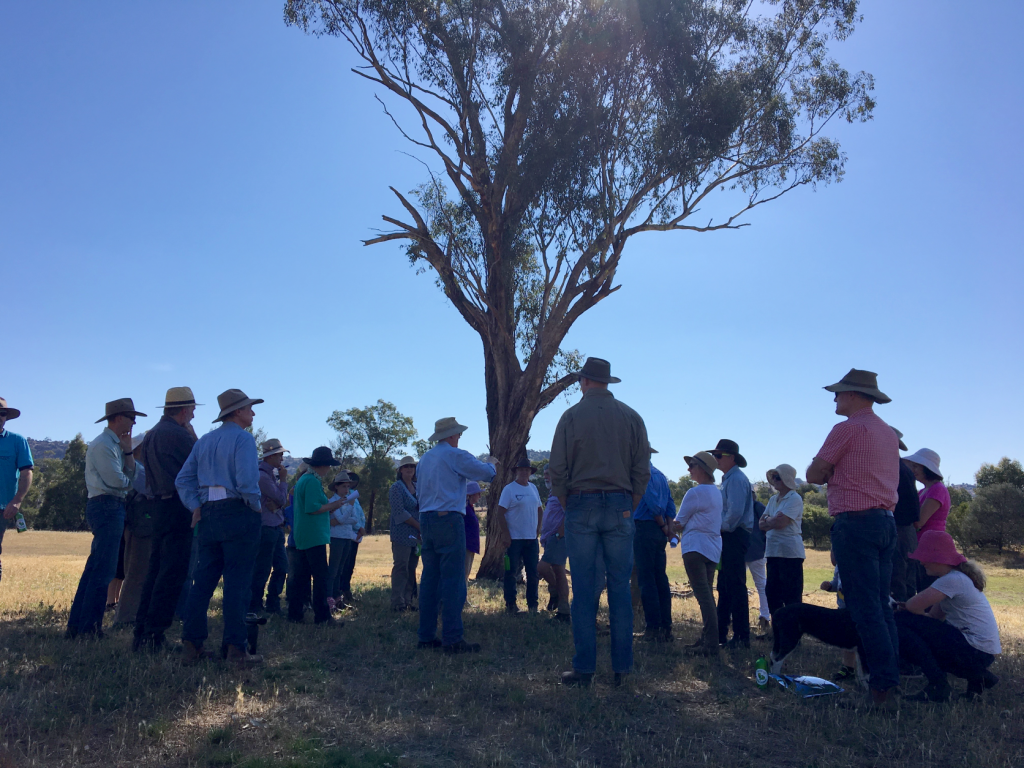
Funded by the Australian Government’s Future Drought Fund and a range of other donor partners, the program focuses on strengthening social connectedness, building social capital and funding transformative local initiatives that will enable agricultural communities to be more prepared for the impacts of drought.
Grants can support a wide range of initiatives including events, projects, activities, training and small-scale infrastructure that will strengthen community engagement, networking and preparedness for drought. In this second round, FRRR is particularly keen to hear from groups seeking between $20,000 and $50,000, although there are other tiers of funding available.
Natalie Egleton, CEO of FRRR, said that the Future Drought Fund’s Networks to Build Drought Resilience program focuses on supporting locally-led drought initiatives that build and strengthen connections in agricultural communities that are vulnerable to drought.
“Each community faces its own unique set of stressors and challenges, and is starting from a different place when it comes to building drought resilience. That’s why this program funds projects that local communities have identified will help their community better prepare for the future impacts of climate change.
“In some places, that’s initiatives like strengthening young-farmer or women in agriculture networks, and for others it might be about building knowledge of soils or better understanding the latest tools and technologies around climate and seasonable variability. Yet in other places, the emphasis might need to be on wellbeing and building mental resilience.
“We’re particularly keen to see proactive initiatives that bring communities together, to create and strengthen social networks to engage in meaningful collaboration. This is a critical part of making sure remote, rural and regional communities can thrive in the future,” Ms. Egleton said.
For more information about the Future Drought Fund’s Networks to Build Resilience program, visit www.frrr.org.au/networks.
There will be a free grantseeker workshop on 5 October at 11am and 7pm AEDT, for those who would like to learn more about the program and the application process. Register here: https://events.humanitix.com/networks-to-build-drought-resilience.
Applications close 15 November, with funds announced late February. Activities must be completed by 29 August 2022.
In this quarter’s update for FRRR’s donor partners, read about:
- Grants in Action: Bootstraps working to strengthen community social fabric
- FRRR launches Heartbeat of Australia Study
- Partnering Opportunity – Building resilience to drought
- Donor Spotlight: Portland House Foundation
- Insights from the bush
- Community Partner Spotlight: St Paul’s Carcoar Community Facility Ltd.
- Our progress, with your support
